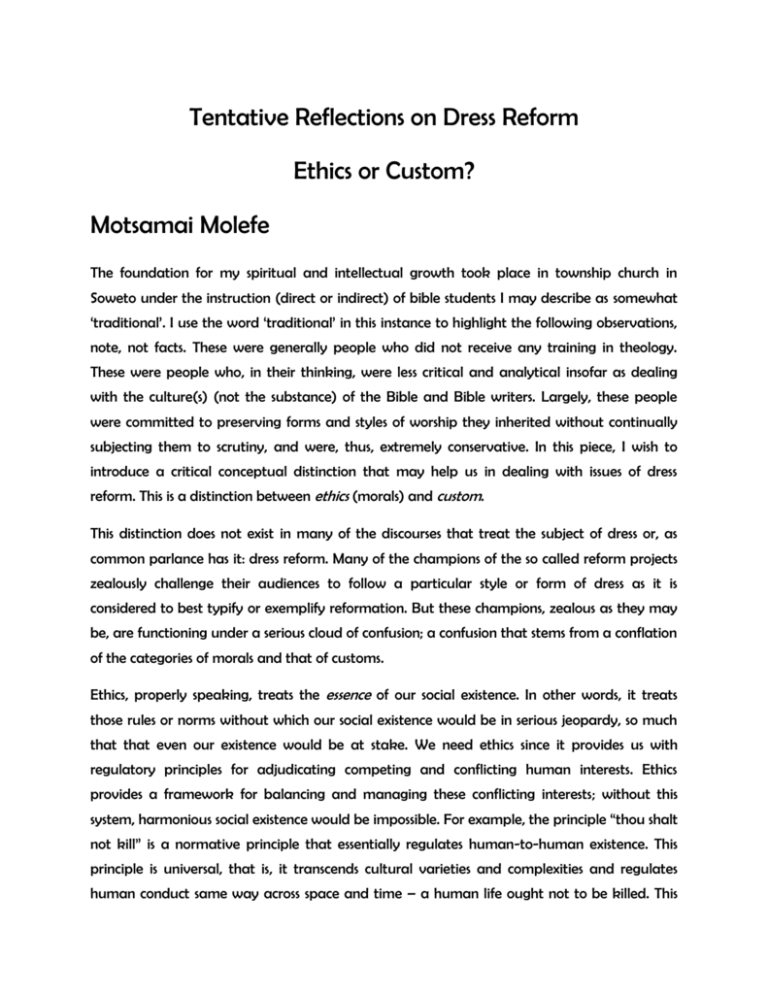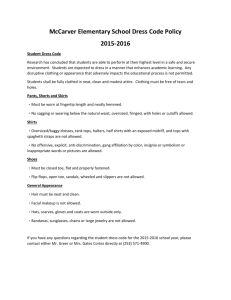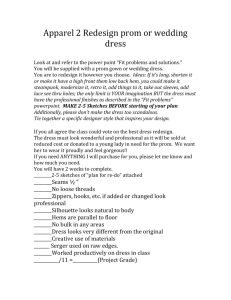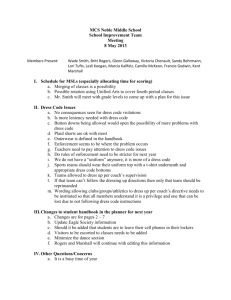Tentative Reflections on Dress Reform Ethics or Custom? Motsamai
advertisement

Tentative Reflections on Dress Reform Ethics or Custom? Motsamai Molefe The foundation for my spiritual and intellectual growth took place in township church in Soweto under the instruction (direct or indirect) of bible students I may describe as somewhat ‘traditional’. I use the word ‘traditional’ in this instance to highlight the following observations, note, not facts. These were generally people who did not receive any training in theology. These were people who, in their thinking, were less critical and analytical insofar as dealing with the culture(s) (not the substance) of the Bible and Bible writers. Largely, these people were committed to preserving forms and styles of worship they inherited without continually subjecting them to scrutiny, and were, thus, extremely conservative. In this piece, I wish to introduce a critical conceptual distinction that may help us in dealing with issues of dress reform. This is a distinction between ethics (morals) and custom. This distinction does not exist in many of the discourses that treat the subject of dress or, as common parlance has it: dress reform. Many of the champions of the so called reform projects zealously challenge their audiences to follow a particular style or form of dress as it is considered to best typify or exemplify reformation. But these champions, zealous as they may be, are functioning under a serious cloud of confusion; a confusion that stems from a conflation of the categories of morals and that of customs. Ethics, properly speaking, treats the essence of our social existence. In other words, it treats those rules or norms without which our social existence would be in serious jeopardy, so much that that even our existence would be at stake. We need ethics since it provides us with regulatory principles for adjudicating competing and conflicting human interests. Ethics provides a framework for balancing and managing these conflicting interests; without this system, harmonious social existence would be impossible. For example, the principle “thou shalt not kill” is a normative principle that essentially regulates human-to-human existence. This principle is universal, that is, it transcends cultural varieties and complexities and regulates human conduct same way across space and time – a human life ought not to be killed. This principle follows men not only in the public space, which is saturated by state policing and social policing, but, further, follows the conduct of men even in his private space. It is wrong to kill whether in public or in private. I am aware of the exception of killing for the sake of selfdefense. Thus, ethics deals with the essence and substance of what we owe each other in the context of social existence. Thus, ethics is generally characterized by the following concepts: right, wrong, permissible, duty and obligatory. On the other hand, custom treats the form and styles that are to characterize our social existence. Kwasi Wiredu, a leading African philosopher, defines custom to deal “with prescriptions and proscriptions operative in a community regarding life and death, work and leisure, reward and retribution, aspirations and aversions, pleasure and pain, and the relationship between the sexes, the generations and other social categories and classes” Wiredu, 1992: 3). Lious Pojman, an American Philosopher, also defines custom in this wise – “It represents society’s decisions about how are we to dress, greet one another, eat, celebrate festivals, carry out social transactions, and dispose of the dead” (Pojman, 2002: 3, emphasis mine). Thus, custom deals with whether a behavior is polite, modest or appropriate and not with whether it is right or wrong, that would be an ethical terrain. In other words, ethics gets to the heart of what is of vital importance for personal and social existence. Ethical norms or truths are discovered, but customary prescriptions or proscriptions are a cultural invention. I stated above that ethical norms are discoveries and customary prescriptions/proscriptions are inventions. The notion of ethics being ‘discovered’ implies that ethical principles first of all are independent of what we think and they are true whether we believe them or not. In other words, ethical norms are objectively true. On the other hand, customs are relative to society and locality. As such, it is a serious cultural imperialism for one to flaunt and impose his culture on others. With this distinction out of the way, we may get on to our discussion of dress reform. To further illuminate issues on the table, I will use the following examples. In some cultures a dead body is burnt up; in some other it is buried and in some other, am told, dead bodies are eaten. Each cultural group would express disgust towards the other group conduct relative to their treatment of the dead due to differing cultural practices. The difference between these three groupings lies in their differing cultural prescriptions over how to treat the dead, but all these cultures agree it is wrong to kill an innocent person. Some cultures eat with a fork and knife; others prefer using their hands and others use sticks. In some cultures, if one were to eat with a bare hand and not use a spoon or a stick that would be seen as impolite and inappropriate conduct. But it would be incorrect to classify this act as wrong or even right – since that would be a conflation of conceptual categories. Dress, properly speaking, is an issue not so much of ethics but of custom. This is a distinction that has eluded and escaped a grasp of many a discussants of this issue of dress reform. Any talk of dress reform that would rush into saying wearing this and that is wrong is itself wrong since it is confusing customs for ethics. The best we could say about certain styles and forms of dress is that they are inappropriate relative to some culture which has to define for us what is appropriate or inappropriate. Thus, when we are discussing issues of dress reformation we are engaging on a cultural or customary project and not so much an ethical project. If this project has any traces of ethical considerations, these are ethical only derivatively and not directly. For example, if in our society we think there is something wrong with mini-skirts, we are actually thinking that wearing of mini-skirts is inappropriate. Thus, accurately speaking we ought never to say that it is wrong to wear a mini-skirt, in fact, it is not wrong to wear a mini-skirt. It is simply inappropriate relative to some (not all societies) society. There are societies that specialize in wearing clothes in our sexualized societies that we consider to be inappropriate since they are flaunt a sex appeal or make women to look cheap. It is these socialized psychological dispositions that make the wearing of a mini-skirt wrong but societies with no such socialization would not consider such dresses to be inappropriate. As such, when we are having a debate about dress reform, at heart, we are having a debate, minimally, about ethics but, largely, about our customs and how they shape our attitudes towards dress. Sometimes the problem is not so much of a mini-skirt, but so much what our society has taught us about short-dresses and (the supposed) connotations of sexuality. I hope it is obvious to any candid reader that there is nothing sexual about a mini-skirt, it is our socialized minds that read sexuality into it. I am not suggesting that some young ladies do not wear short dresses to intentionally seduce men and I do not suggest that men are not seriously brought to temptation by such dresses. I am however arguing that if we take a discussion at a level of a mini-skirt we are taking the discussion at a wrong point. We should be critically be assessing and questioning the implicit and explicit sexual education that objectifies our sisters and their dressing. We should be seriously be rethinking the cultural semiotics of sexuality and aesthetics as taught in our society and be very critical of these. Thus, if dress is a human cultural invention, it occupies a different status than ethics, which according to Christianity flowed from the very mouth and hand of God (Exod 20: 1 -17; Duet 10: 1 – 7). Talk of dress reformation is thus an enquiry into human standards of what is appropriate. I want to put to the reader that the Bible does not tell us what is appropriate or does not give us a way of determining whether some way of dressing is appropriate or not - all that is to be determined by human beings in a quest to have a world that is characterized by decent and appropriate graces of our social existence. The Bible merely specifies that males and females have to dress in a way that preserves their distinct sexes or genders (Duet 22: 5; I Cor 11: 5 – 7). But the Bible does not tell us what clothes are suitable for men and what are for women; this question is to be answered by human beings in their invention of culture. In finding our answer with an attempt to create semiotics to differentiate between men and women and how they are to relate to each other by appeal to the differing (semiotic) materials of different cultures, we must realize that this process is one that is essential contested, since no one has finality over issues of culture, particularly in the world that can rightly be described as post-modern (advanced modernities). If cultural issues are essentially contested and ought to be since they are a human invention, this would mean we should remain open and simultaneously circumspect of voices that would render themselves authorities on these issues. It also means we should always be critical of both culture and the creators of culture in the form of fashion houses and the way they conceive and represent the different sexes on the issues of dress. This also means that even the dress code of the children of Israel could not be considered as normative since it was their invention influenced by their context and prevailing customs of their agri-traditional societies. Thus, approaches to dress reform that merely simplify issues of dress reform to pants and skirts are oversimplifying the issues, as such, are unhelpful and uncritical of differing trajectories of cultural development and the change that attend to them. This is the case since prescriptions or inventions of men are not eternal and fixated, they are alterable. The space for possible and actual alterations of the prescriptions and proscriptions of culture makes any attempt of eternal pronunciation on issues of dress otiose and inane. Thus, talk of dress reform is thus to be specifically directed to talk of cultural development and thorough cultural education. Thus, anyone who attempts to talk on issues of dress without a thorough analysis of the history of dress within the modern world that is strongly influenced by the West is diving in the issue at the shallow end. Talk of dress reform that does not extensively study the marketing strategies of fashion houses and their future trajectories is too parochial to achieve any meaningful contribution to challenging the space for having a voice in the crafting of a voice to would add to what would count as appropriate or inappropriate. Thus, those who are agitating for dress reform, I argue, ought to understand their discourse within a broader cultural space and understand that theirs actually is call for more refined standards when it comes to dress in a quest to influencing and inventing appropriate formalities of dress that would allow for overlapping agreements and disagreements given that none can and ought to claim finality on issues of dress. References Pojman, L. (2002). What is Ethics? In L. Pojman (Ed) Ethical Theory: Classic and Contemparary Readings. London: Wadsworth., 1 – 7. Wiredu, K. (1996). Cultural Universals and Particulars: An African Perspective. Indianapolis: Indiana University Press.








